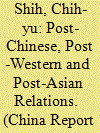| Srl | Item |
| 1 |
ID:
158723


|
|
|
|
|
| Summary/Abstract |
Scholars of International Relations have called for the creation of a post-Western IR that reflects the global and local contexts of the declining power and legitimacy of the West. Recognising this discourse as indicative of the postcolonial condition, we deploy Homi Bhabha’s concept of mimicry and James C. Scott’s notion of mētis to assess whether international political dynamics of a hybrid kind are emerging. Based on interviews with Central Asian political, economic, and cultural elites, we explore the emergence of a new global politics of a post-Western type. We find that Russia substantively mimics the West as a post-Western power and that there are some suggestive examples of the role of mētis in its foreign policy. Among Central Asian states, the picture is more equivocal. Formal mimicry and mētis of a basic kind are observable, but these nascent forms suggest that the dialectical struggle between colonial clientelism and anti-colonial nationalism remains in its early stages. In this context, a post-Western international politics is emerging with a postcolonial aspect but without the emergence of the substantive mimicry and hybrid spaces characteristic of established postcolonial relations.
|
|
|
|
|
|
|
|
|
|
|
|
|
|
|
|
| 2 |
ID:
179778


|
|
|
|
|
| Summary/Abstract |
Arguing that studies of China must simultaneously be studies of East Asia, this article offers a philosophically critical reflection on the meaning of Chineseness in lieu of the theme of the special issue—East Asia. The two regions are reciprocally holographical of each other. The latter part of the article will further propose a research agenda of post-Asianness. I hope to convey a message that is hidden but strong: that East Asia is a redundant agenda and yet fungible at the same time. This ontological irony can be likewise applied to both Chineseness and Asianness. Ultimately, China, East Asia and Asia are mainly strategic agendas and identities. The critical reflections outlined in this article are intended to display, facilitate and complicate the pluriversality of all post-identities.
|
|
|
|
|
|
|
|
|
|
|
|
|
|
|
|